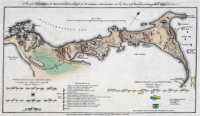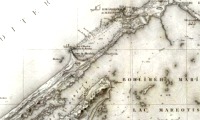

|
The following details for the Inniskillings are provided by Copeland-Trimble and Joseph's service is drawn from musters and paybooks (National Archives). General descriptions of the Egypt campaign are provided by Wilson and Barthorp.
On 20th December 1800 Abercromby's army sailed for Marmorice (now known as Marmaris) Bay, on the Turkish mainland north of Rhodes, in preparation for the invasion of Egypt. By now the Inniskillings had been living on board their transports in crowded conditions for five months and both battalions were suffering severe illness. The 1st Battalion was left at Malta to recover and the 2nd was ordered back to Lisbon. The 2nd recovered quickly and embarked once again for Egypt, arriving in time to play a major role in the landing at Aboukir Bay on 8th March 1801.
By the time that the 1st Battalion arrived from Malta on 7th May, the French had been joined by 6000 reinforcements but had been defeated at the Battles of Mandora (13th March) and Canope (21st March) and were under siege in Alexandria. Abercromby was mortally wounded at Canope and was succeeded by General Hely-Hutchinson.
One of Hutchinson's first decisions was to secure the British position by flooding Lake Mareotis and on the evening of April 12th the banks of the Alexandria canal were breached in several places allowing water to flood in from Lake Aboukir. Joseph was part of the force under General Coote which laid siege to Alexandria while Hutchinson, with British reinforcements from India and the Cape, advanced up the Nile to drive the French out of Cairo. On 15th July the French surrendered and were escorted from Cairo; they were embarked for France on 30th July.
 British troops in camp, Egypt, 1801
In June and July Joseph was in camp to the east of Alexandria. By August Hutchinson had returned and on the 9th he began operations to take Alexandria. Major General Coote was tasked with blockading the westward side of Alexandria to deny the French access to Arab supply lines. The 1st Battalion of the Inniskillings were amongst the 4000 men under his command. He ordered them to strike their tents at 6am on the 16th and to carry them immediately to the depot on the canal where boats were assembled. They began to embark at 7pm. They carried four days ready cooked provisions, a full canteen of water but only one day's spirits. Spirits for three more days were in the charge of corps quartermasters! Embarkation and loading of equipment took place in complete silence under the supervision of Captain Hillaire of the Royal Navy.
Coote had hoped to disembark his force on the narrow strip of land between Marabout and Alexandria but this was occupied by the enemy. He left a brigade in position to threaten a landing while the rest of his division sailed three miles further west to make an unopposed landing. They took up position for a siege of Fort Marabout and were fortunate to find good water close to the surface. Artillery was brought up and bombardment of the fort from land and sea began on the night of the 18th. By midday on the 20th the tower of Marabout fell and by evening the garrison had surrendered.
On the 22nd Coote's men advanced in three columns towards Alexandria with the Inniskillings in General Ludlow's brigade in the column on the left of the isthmus near the harbour. Joseph was part of the advanced guard which included the 1st Battalion of the 27th, a detachment of Lowenstein's Chasseurs under Major Pepongay and two hundred Guards commanded by Colonel Joliffe. They were followed by six pieces of light artillery and two squadrons of the 23rd Dragoons. The French retreated under threat from the bayonet, abandoning their tents and camp baggage. None of Coote's other forces fired a shot. The French had lost 200 killed, wounded or taken prisoner; British losses were 3 killed and 40 wounded.
They set up camp 1400 yards from Alexandria in sight of the port and in the midst of the catacombs of Alexandria, temple of Diana and baths of Cleopatra. But to get good water they had to go back four miles!
On the 16th September Joseph was reduced to a private, transferred to the Light Company of Capt. Moncrieffe Willoughby and returned to camp east of Alexandria. On the 27th the French requested an armistice, signed their capitulation on 2nd September and were embarked for France.
Towards the end of September Joseph and the Inniskillings returned to Malta where they formed part of the garrison. Private Joseph Ratcliff's pay at this time was 6d per day.
- Copeland Trimble, W.,The Historical Record of the 27th Inniskilling Regiment: From the Period of its Institution as a Volunteer Corps till the Present Time
 , Clowes & Sons, London, 1876. , Clowes & Sons, London, 1876.
- National Archives, General Muster Books and Pay Lists, 27th Foot 1st Battalion, WO12/4330 (1789-1797), WO12/4331 (1798-1799), WO12/4332 (1800), WO12/4333 (1801), WO12/4334 (1802), WO1212/4335 (1803)
- Wilson, Robert, History of the British Expedition to Egypt, 1803
- Barthorp, Michael, Napoleon's Egyptian Campaign, 1798 – 1801, Osprey Publishing, Oxford 1978.
|



